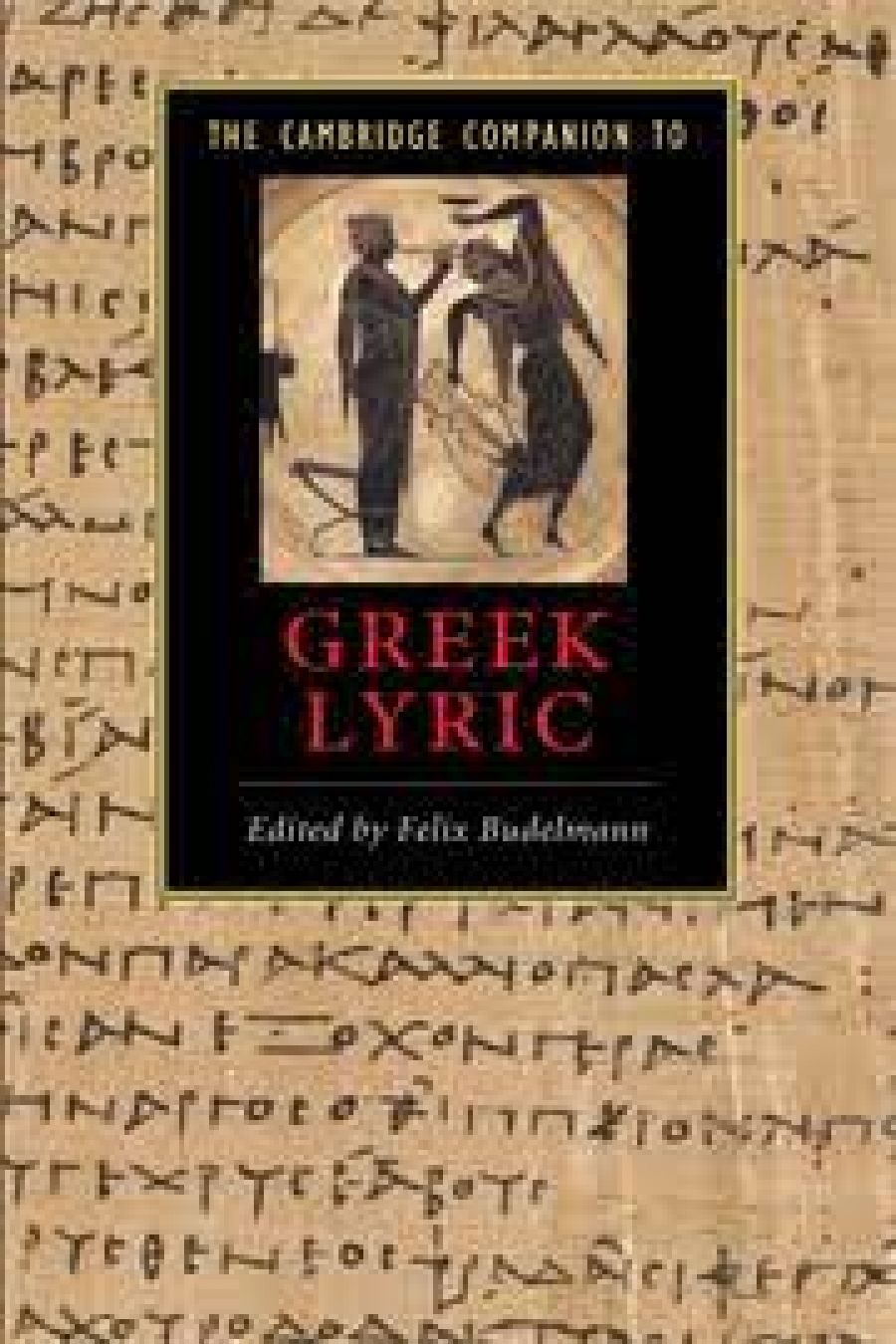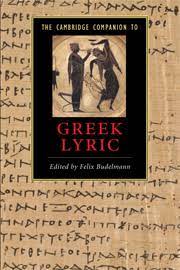
- Free Article: No
- Contents Category: Literary Studies
- Review Article: Yes
- Article Title: ‘Eros shook my heart’
- Online Only: No
- Custom Highlight Text:
It is easy to be complacent about the Greeks. We know they invented democracy, philosophy, drama, the principle of free speech and other things that we value highly; but how often do we read the works of Homer and Hesiod, of Aeschylus, Sophocles and Euripides, of Herodotus and Thucydides, of Plato and Aristotle? How often do we reflect that the Greeks gave the West the very idea of literature? The heritage is so rich that there are whole periods and genres that many readers may never have encountered, except in the most tangential way.
- Book 1 Title: The Cambridge Companion to Greek Lyric
- Book 1 Biblio: Cambridge University Press, $59.95 pb
- Book 1 Cover Small (400 x 600):

- Book 1 Cover (800 x 1200):

‘Eros shook my heart like a mountain wind falling upon a grove of oaks’; the beginner in Greek, painstakingly deciphering Sappho’s words with lexicon in hand, feels like an archaeologist slowly uncovering a piece of classical statue in the desert sand. Time and again the experience is repeated in different modes: miraculously living and poignant words reaching us from a distance of two and a half millennia, mostly in tantalising fragments, speaking of love, jealousy, friendship, victory and defeat, youth, age and death, with a crystalline brilliance that is unsurpassed in subsequent literature.
Even for reasonable readers of Greek, these texts are nonetheless harder to approach than Homer or many other dramatic or prose authors. They present frequent difficulties of vocabulary and dialect, as well as topical or local allusions that require elucidation, and many are composed in metres that are much harder to follow than epic or the non-choral parts of tragedy; it is impossible to have an intimate feel for verse that you cannot read aloud. For readers of English and other vernaculars, Lyric has a much poorer history of translation than other genres; there is nothing like the long series of now classic Homeric versions, for example. Some poems, moreover, like those of Anacreon, can seem slight when stripped of their original verbal art, while the elliptical density of a Pindar can be almost impossible to render.
Both groups of readers will benefit from the new Cambridge Companion to Greek Lyric, an outstanding collection of essays that covers all the canonical figures in the tradition, as well as issues of historical and social context, patronage, language, metre, textual transmission and subsequent reception in Hellenistic Greece, Rome and the modern period. As well as Lyric in the narrow sense – poems written as songs and performed to a melodic accompaniment – the volume includes the genres of Iambos and Elegy, which were recited rather than actually sung.
The manner and context of performance is indeed the main concern shared by the various scholars included in the Companion. The volume’s editor, Felix Budelmann, defines the general position clearly, in his introduction, as a corrective to what had become the standard modern view, namely Bruno Snell’s argument that the Lyric poets represent a new stage in the development of self-consciousness and of the Greek mind. Such a thesis is characteristic of an Hegelian philosophy of history, informed by twentieth-century psychoanalysis and sociology, just as the present volume reflects a more recent concern with textual analysis and historical research into the way texts were actually produced and used in social settings.
Although one may be critical of the modernist paradigm of progress that colours Snell’s perspective, it cannot be denied that great and ‘progressive’ changes were taking place from the seventh to the mid fifth centuries bce: what we call the Archaic and early Classical periods. Greek colonies spread around the Mediterranean, especially to Sicily and southern Italy; traditional aristocratic government broke down, to be replaced by tyrannies or incipient democracies; and the pre-Socratic philosophers, scattered, like the poets, all over the vast and decentralised Greek world, began an intellectual adventure as remarkable and original as the work of the poets themselves.
Nonetheless, it is surely right to insist that genre and occasion are as important as anything else in accounting for the surprisingly personal tone of Lyric. It becomes clear that Lyric was a genre, or group of genres, which was defined partly in contradistinction to epic. Homer was the great source on which Lyric could draw and from which it could depart. One of the most sophisticated aspects of Greek culture was this constitution of two poles, one conservative and the other innovative, the former always there as a great reserve on which the latter could draw, and against which it could define itself.
It is crucial to understand the performance context of these poems, because they were all composed to be sung or recited before an audience. Some, choral songs such as dithyrambs in honour of Dionysus, were meant to be sung at religious festivals. There were more private commissions (though the accuracy of this term is rightly questioned in one essay), solo works such as Pindar’s epinikia celebrating an athlete’s victory, and songs – witty, erotic, political or philosophical – designed to be performed by the participants in a symposium, one of those dinner parties that were the most important form of private sociability in the Greek world.
The symposium was above all an inexhaustible occasion for re-performance, and poets composed with this afterlife in mind. People did not read in Greece curled up under a lamp with a novel, in the model we have inherited from the nineteenth century; far more representative is the way Socrates finds Phaedrus memorising a speech so that he can repeat it at a dinner party when it comes to his turn to entertain his fellow guests.
The contribution by two scholars from Sydney University, Eric Csapo and Peter Wilson, deals with the late figure of Timotheus, who – though generally considered the world’s worst poet by critics ancient and modern – turns out to be a much more significant figure than we might have expected, confirming the importance of the traditional performance contexts of the previous centuries, even as he represents their breakdown.
Lyric poetry had always been closely involved with the social, political and religious life of the polis, sometimes expressing values and ideas shared by a whole community, sometimes by a party or faction, sometimes by friends or lovers; but it was always performative, participatory and engaged. Timotheus, in contrast, seems to have been a professional showman – presumably a better actor and musician than a lyricist – watched by a now passive audience. He turned Lyric into entertainment. Without the context that had given the genre its vitality, it soon became extinct, only to be revived centuries later, in a different and self-consciously literary form, by Horace.


Comments powered by CComment